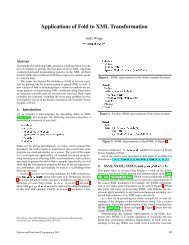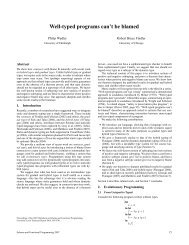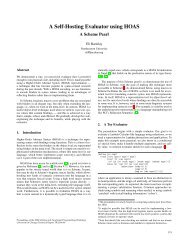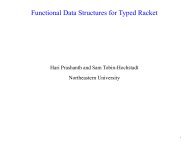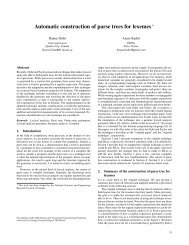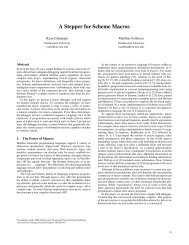2006 Scheme and Functional Programming Papers, University of
2006 Scheme and Functional Programming Papers, University of
2006 Scheme and Functional Programming Papers, University of
You also want an ePaper? Increase the reach of your titles
YUMPU automatically turns print PDFs into web optimized ePapers that Google loves.
Figure 3: Regular Expressions <strong>and</strong> Names<br />
datatype Regexp =<br />
Alpha<br />
| AlphaNum<br />
| Kleene <strong>of</strong> Regexp<br />
| Concat <strong>of</strong> Regexp * Regexp<br />
| Or <strong>of</strong> Regexp * Regexp<br />
| Empty;<br />
let match (r:Regexp) (s:String) : Bool = ...<br />
let Name = {s:String | match (Kleene AlphaNum) s};<br />
“[a-zA-Z0-9]*” would be represented in our datatype as<br />
(Kleene AlphaNum).<br />
The code then uses match to define the type Name, which<br />
refines the type String to allow only alphanumeric strings.<br />
We use the type Name to enforce an important, securityrelated<br />
interface specification for the following function<br />
authenticate. This function performs authentication by<br />
querying a SQL database (where ‘^’ denotes string concatenation):<br />
let authenticate (user:Name) (pass:Name) : Bool =<br />
let query : String =<br />
("SELECT count(*) FROM client WHERE name =" ^<br />
user ^ " <strong>and</strong> pwd=" ^ pass) in<br />
executeSQLquery(query) > 0;<br />
This code is prone to security attacks if given speciallycrafted<br />
non-alphanumeric strings. For example, calling<br />
authenticate "admin --" ""<br />
breaks the authentication mechanism because “--” starts<br />
a comment in SQL <strong>and</strong> consequently “comments out” the<br />
password part <strong>of</strong> the query. To prohibit this vulnerability,<br />
the type:<br />
authenticate : Name → Name → Bool<br />
specifies that authenticate should be applied only to alphanumeric<br />
strings.<br />
Next, consider the following user-interface code:<br />
let username : String = readString() in<br />
let password : String = readString() in<br />
authenticate username password;<br />
This code is ill-typed, since it passes arbitrary user input <strong>of</strong><br />
type String to authenticate. However, proving that this<br />
code is ill-typed is quite difficult, since it depends on complex<br />
reasoning showing that the user-defined function match is<br />
not a tautology, <strong>and</strong> hence that not all Strings are Names.<br />
In fact, Sage cannot statically verify or refute this code.<br />
Instead, it inserts the following casts at the call site to<br />
enforce the specification for authenticate dynamically:<br />
authenticate (〈Name〉 username) (〈Name〉 password);<br />
At run time, these casts check that username <strong>and</strong> password<br />
are alphanumeric strings satisfying the predicate match<br />
(Kleene AlphaNum). If the username “admin --” is ever<br />
entered, the cast (〈Name〉 username) will fail <strong>and</strong> halt program<br />
execution.<br />
2.3 Counter-Example Database<br />
Somewhat surprisingly, a dynamic cast failure actually<br />
strengthens Sage’s ability to detect type errors statically. In<br />
particular, the string “admin --” is a witness proving that<br />
not all Strings are Names, i.e., E ⊬ String (Printf Args format)<br />
where the user-defined function<br />
Printf Args : String -> *<br />
returns the printf argument types for the given format<br />
string. For example, (Printf Args "%d%d") evaluates to the<br />
type Int → Int → Unit. Calls to printf are assigned<br />
precise types, such as:<br />
printf "%d%d" : Int -> Int -> Unit<br />
since this term has type (Printf Args "%d%d"), which in<br />
turn evaluates to Int → Int → Unit.<br />
Thus, the Sage language is sufficiently expressive to need<br />
no special support for accommodating printf <strong>and</strong> catching<br />
errors in printf clients statically. In contrast, other language<br />
implementations require special rules in the compiler<br />
or run time to ensure the type safety <strong>of</strong> calls to printf. For<br />
example, <strong>Scheme</strong> [40] <strong>and</strong> GHC [19, 38] leave all type checking<br />
<strong>of</strong> arguments to the run time. OCaml [27], on the other<br />
h<strong>and</strong>, performs static checking, but it requires the format<br />
string to be constant.<br />
Sage can statically check many uses <strong>of</strong> printf with<br />
non-constant format strings, as illustrated by the following<br />
example:<br />
let repeat (s:String) (n:Int) : String =<br />
if (n = 0) then "" else (s ^ (repeat s (n-1)));<br />
// checked statically:<br />
printf (repeat "%d" 2) 1 2;<br />
The Sage compiler infers that printf (repeat "%d" 2)<br />
has type Printf Args (repeat "%d" 2), which evaluates<br />
(at compile-time) to Int → Int → Unit, <strong>and</strong> hence this<br />
call is well-typed. Conversely, the compiler would statically<br />
reject the following ill-typed call:<br />
// compile-time error:<br />
printf (repeat "%d" 2) 1 false;<br />
For efficiency, <strong>and</strong> to avoid non-termination, the compiler<br />
performs only a bounded number <strong>of</strong> evaluation steps before<br />
resorting to dynamic checking. Thus, the following call requires<br />
a run-time check:<br />
96 <strong>Scheme</strong> <strong>and</strong> <strong>Functional</strong> <strong>Programming</strong>, <strong>2006</strong>




